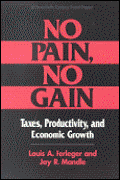Productivity growth in the United States and other advanced economies has slowed sharply over the past decade. If this slowdown persists, it will mean more slowly rising living standards and more difficult fiscal challenges. What public policies might quicken the pace of productivity growth in the U.S.?
We put that question recently to a panel of experts convened by the Hutchins Center on Fiscal and Monetary Policy and the Initiative on Business and Public Policy. Here are some of their suggestions.
1. More competition
One solution to the productivity slowdown on which there was broad consensus was the need to enhance competition.
Competition promotes productivity growth through increased incentives for innovation and through selection. If firms have strong incentives to innovate, many productivity-boosting innovations will come to market. Also, when only the firms with the highest productivity survive while the least productive firms are forced to exit the market, the average productivity will go up. Jonathan Baker, a lawyer and economist who teaches at American University’s Washington College of Law, believes that there is room to improve competition in the U.S. economy. “Market power is a problem in the U.S. economy… it’s plausible that growing market power has contributed to the productivity slowdown,” he explains.
Competition can be increased in a number of ways, including by strengthening antitrust enforcement and by reforming the patent system so that patents are not used to shut out potential competitors while providing enough incentives for firms to invest in developing innovations. Bronwyn Hall, emerita professor of economics at the University of California at Berkeley, suggested that in some industries it’s currently too easy to get a patent. “Most of [us] who look closely at [the patent system] …. think that the requirement for novelty is a little too low… And so we do think there’s room for reform in the patent area.”
Occupational licensing is another area that might have room for improving competition. “There’s been tremendous growth in this country in occupational licensing requirements… And that’s got to harm entry barriers and make it hard for people to move in and out of occupations. And it’s not just … doctors, it’s things like cosmetologists… a whole range of jobs,” says Baker.
It also is important to avoid policies that might stifle productivity. Some of such policies have been popular in this year’s political campaign. “If you think about the ongoing political campaign, the policies that have been given a lot of attention include things like restrictions on trade and immigration… These are not the kinds of policies you want to think about if you’re going to think about enhancing productivity,” says Robert Barro, a Harvard University economist.
2. Better skills
Policies to increase the skills of the workforce are essential to raising productivity as well. Isabel Sawhill, a senior fellow at the Brookings Institution, argued that policies that increase years of schooling might not be enough. She stressed the importance of ensuring that those years of schooling actually translate into skills and knowledge. She noted that more than two-thirds of young adults today would fail to quality for military service, because of lack of education, drug addiction, jail records, and other shortcomings, which also suggests that they may not have the capabilities to be very productive in the workplace.
3. Smarter R&D funding
Improving the allocation of funding to research and development is another area that might improve prospects for productivity growth over the long run. Hall pointed out that the allocation of federal funding for basic science R&D is skewed towards life sciences and argued that this isn’t a great strategy: “We can’t tell now what field of science will be useful in the future… It’s just like the stock market…. And so all we can do is have a portfolio that is more balanced in the basic science spending.”
4. Focus on low-hanging fruit
Finally, economist Brad DeLong of the University of California at Berkeley suggested that policy focus on “low-hanging fruit”—those industries that subtract value from our economy rather than add to it. One example of such a value-subtracting industry is healthcare administration, he believes: “Our doctors, nurses, and pharmacists do wonderful things, but as [Princeton’s] Uwe Reinhart likes to say, you do the national income accounting and our healthcare administrators are about one-eight as productive as German [health care professionals] because they’re all working against each other either trying to get things covered or trying not to get things covered.”







Commentary
Four ways to speed up productivity growth
September 20, 2016